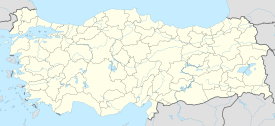| Revision as of 13:08, 9 March 2021 editLouisAragon (talk | contribs)Autopatrolled, Extended confirmed users, Pending changes reviewers, Rollbackers71,872 edits + added information, added reference← Previous edit | Revision as of 13:11, 9 March 2021 edit undoLouisAragon (talk | contribs)Autopatrolled, Extended confirmed users, Pending changes reviewers, Rollbackers71,872 edits + added referenceNext edit → | ||
| Line 42: | Line 42: | ||
| ==Etymology== | ==Etymology== | ||
| "Eruandashat", which translates as "Joy of Orontes", is the ] form of the toponym and derives from ] ''*Arwandašād'' (compare ] ''*Aruvanta-šiyāti-'').<ref>{{cite book |first1=Matthew P. |last1=Canepa|authorlink=Matthew P. Canepa|title=The Iranian Expanse: Transforming Royal Identity through Architecture, Landscape, and the Built Environment, 550 BCE–642 CE |date=2018 |publisher=University of California Press|page=99|isbn=978-0520964365|url=https://muse.jhu.edu/book/62562}}</ref> | "Eruandashat", which translates as "Joy of Ervand (i.e. Orontes)", is the ] form of the toponym and derives from ] ''*Arwandašād'' (compare ] ''*Aruvanta-šiyāti-'').<ref>{{cite book |first1=Matthew P. |last1=Canepa|authorlink=Matthew P. Canepa|title=The Iranian Expanse: Transforming Royal Identity through Architecture, Landscape, and the Built Environment, 550 BCE–642 CE |date=2018 |publisher=University of California Press|page=99|isbn=978-0520964365|url=https://muse.jhu.edu/book/62562}}</ref><ref>{{cite encyclopedia | title = ERUANDAŠAT | last = Hewsen | first = Robert H. | authorlink = | url = https://www.iranicaonline.org/articles/eruandasat | editor-last = | editor-first = | editor-link = | encyclopedia = Encyclopaedia Iranica, Vol. VIII, Fasc. 6 | page = 562 | location = | publisher = | year = 1998 | isbn = |ref=harv}}</ref> | ||
| ==History== | ==History== | ||
Revision as of 13:11, 9 March 2021
"Yervandashat" redirects here. For other uses, see Yervandashat (disambiguation).| Երվանդաշատ | |
 The heights on the right bank of Aras River are the site of ancient Yervandashat The heights on the right bank of Aras River are the site of ancient Yervandashat | |
 | |
| Location | 1 km east of the current village of Yervandashat, Armenia, on the right bank of Aras River in modern-day Turkey |
|---|---|
| Coordinates | 40°07′N 43°39′E / 40.117°N 43.650°E / 40.117; 43.650 |
| History | |
| Builder | King Orontes IV of Armenia |
| Founded | 210 BC |
| Abandoned | 360 |
Yervandashat or Eruandashat (Template:Lang-hy), was an Armenian city and one of the 13 historic capitals of Armenia, serving as a capital city between 210 and 176 BC during the Orontid rule over Armenia and the beginning of their successors; the Artaxiad dynasty.
Etymology
"Eruandashat", which translates as "Joy of Ervand (i.e. Orontes)", is the Armenian form of the toponym and derives from Middle Persian *Arwandašād (compare Old Persian *Aruvanta-šiyāti-).
History
Yervandashat was built around 210 BC by the last Orontid king Orontes IV of Armenia. It was at a height on the right bank of Aras River, in the Arsharunik canton of Ayrarat province of Armenia Major. Its site is 1 km east of the modern Armenian village of Yervandashat, in the current Turkish Province of Iğdır.
According to Movses Khorenatsi, Orontes founded Yervandashat to replace Armavir as his capital after Armavir had been left dry by a shift of the Arax River.
Ancient Yervandashat was destroyed by the army of the Persian King Shapur II in the 360s AD.
The archaeological site has not been the subject of major research, but preliminarily, the fortifications and some remains of palaces have been uncovered.
References
- Cyrille Toumanoff. Studies in Christian Caucasian history. — Georgetown University Press, 1963. — С. 75.:"The capitals of Armenia were successively: Armavira or Armawir of the Orontids (Manandyan, O torgovle 37) until the transfer by Orones IV of his residence to Eruandasat (*Orontasata)"
- Canepa, Matthew P. (2018). The Iranian Expanse: Transforming Royal Identity through Architecture, Landscape, and the Built Environment, 550 BCE–642 CE. University of California Press. p. 99. ISBN 978-0520964365.
- Hewsen, Robert H. (1998). "ERUANDAŠAT". Encyclopaedia Iranica, Vol. VIII, Fasc. 6. p. 562.
{{cite encyclopedia}}: Invalid|ref=harv(help) - Yervandashat
| Historical capitals of Armenia | |
|---|---|
|
This article about an Eastern Anatolia Region of Turkey location is a stub. You can help Misplaced Pages by expanding it. |
This article relating to archaeology in Turkey is a stub. You can help Misplaced Pages by expanding it. |